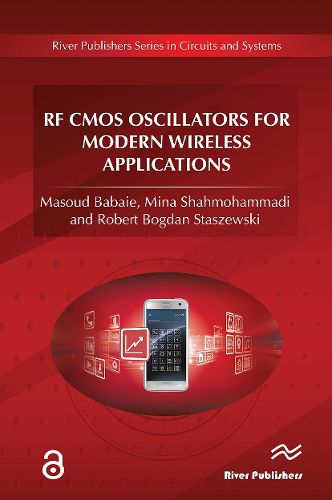Readings Newsletter
Become a Readings Member to make your shopping experience even easier.
Sign in or sign up for free!
You’re not far away from qualifying for FREE standard shipping within Australia
You’ve qualified for FREE standard shipping within Australia
The cart is loading…






While mobile phones enjoy the largest production volume ever of any consumer electronics products, the demands they place on radio-frequency (RF) transceivers are particularly aggressive, especially on integration with digital processors, low area, low power consumption, while being robust against process-voltage-temperature variations. Since mobile terminals inherently operate on batteries, their power budget is severely constrained. To keep up with the ever increasing data-rate, an ever-decreasing power per bit is required to maintain the battery lifetime. The RF oscillator is the second most power-hungry block of a wireless radio (after power amplifiers). Consequently, any power reduction in an RF oscillator will greatly benefit the overall power efficiency of the cellular transceiver. Moreover, the RF oscillators' purity limits the transceiver performance. The oscillator's phase noise results in power leakage into adjacent channels in a transmit mode and reciprocal mixing in a receive mode. On the other hand, the multi-standard and multi-band transceivers that are now trending demand wide tuning range oscillators. However, broadening the oscillator's tuning range is usually at the expense of die area (cost) or phase noise.
The main goal of this book is to bring forth the exciting and innovative RF oscillator structures that demonstrate better phase noise performance, lower cost, and higher power efficiency than currently achievable.
Technical topics discussed in RF CMOS Oscillators for Modern Wireless Applications include: ? Design and analysis of low phase-noise class-F oscillators? Analyze a technique to reduce 1/f noise up-conversion in the oscillators? Design and analysis of low power/low voltage oscillators? Wide tuning range oscillators? Reliability study of RF oscillators in nanoscale CMOS
$9.00 standard shipping within Australia
FREE standard shipping within Australia for orders over $100.00
Express & International shipping calculated at checkout
While mobile phones enjoy the largest production volume ever of any consumer electronics products, the demands they place on radio-frequency (RF) transceivers are particularly aggressive, especially on integration with digital processors, low area, low power consumption, while being robust against process-voltage-temperature variations. Since mobile terminals inherently operate on batteries, their power budget is severely constrained. To keep up with the ever increasing data-rate, an ever-decreasing power per bit is required to maintain the battery lifetime. The RF oscillator is the second most power-hungry block of a wireless radio (after power amplifiers). Consequently, any power reduction in an RF oscillator will greatly benefit the overall power efficiency of the cellular transceiver. Moreover, the RF oscillators' purity limits the transceiver performance. The oscillator's phase noise results in power leakage into adjacent channels in a transmit mode and reciprocal mixing in a receive mode. On the other hand, the multi-standard and multi-band transceivers that are now trending demand wide tuning range oscillators. However, broadening the oscillator's tuning range is usually at the expense of die area (cost) or phase noise.
The main goal of this book is to bring forth the exciting and innovative RF oscillator structures that demonstrate better phase noise performance, lower cost, and higher power efficiency than currently achievable.
Technical topics discussed in RF CMOS Oscillators for Modern Wireless Applications include: ? Design and analysis of low phase-noise class-F oscillators? Analyze a technique to reduce 1/f noise up-conversion in the oscillators? Design and analysis of low power/low voltage oscillators? Wide tuning range oscillators? Reliability study of RF oscillators in nanoscale CMOS